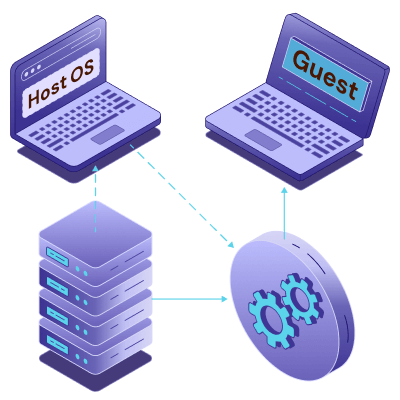VPS stands for Virtual Private Server, and it is a popular hosting solution that balances the benefits of shared hosting and dedicated servers. It offers flexibility, reliability, and control, making it an ideal choice for businesses and individuals seeking a scalable and cost-effective hosting environment.
As online projects grow in complexity, the need for a hosting solution that provides dedicated resources and performance without the hefty price tag of dedicated servers becomes more pressing. VPS hosting fills this gap by leveraging virtualization technology to create isolated environments within a single physical server.
This article delves into the meaning of VPS, its key features, advantages, and use cases, helping you determine if it’s the right choice for your needs.
What Is a VPS?
Let’s dive in on what is a vPS and how does it work. VPS stands for Virtual Private Server, a hosting environment where a physical server is divided into multiple virtual servers using virtualization technology. Each VPS operates independently with its own dedicated resources, operating system, and software environment, making it function like a mini dedicated server.
How Does It Work?

Virtualization software, known as a hypervisor, is used to create separate compartments on a single physical server. Each compartment (or VPS) is allocated specific resources, such as CPU, RAM, and storage, ensuring isolation from other virtual servers on the same machine.
Comparison to other hosting types
- Shared Hosting: In shared hosting, all users share the same server resources, which can lead to performance issues if one user consumes more resources. VPS eliminates this problem by isolating resources for each user.
- Dedicated Servers: While dedicated servers provide complete control over a physical server, they are significantly more expensive. VPS hosting offers a middle ground with similar control at a fraction of the cost.
- Cloud Hosting: Cloud hosting uses multiple servers to create a networked environment, offering dynamic scalability. VPS hosting, on the other hand, relies on a single physical server with fixed resources.
VPS hosting is ideal for those who require more control and stability than shared hosting but do not need the full capacity of a dedicated server.
Key Features and Advantages of VPS Hosting
Understanding the meaning of VPS reveals how its features and advantages cater to a wide range of needs. This naturally leads to the question: what is a VPS server used for in real-world scenarios? It’s commonly employed for tasks such as hosting websites, running resource-intensive applications, and providing isolated environments for development and testing.
Key Features of VPS Hosting
VPS hosting comes with several key features that set it apart from other hosting solutions. These features are designed to provide users with flexibility, performance, and control over their hosting environment:
- Dedicated Resources: Each VPS is allocated specific amounts of CPU, RAM, and storage, ensuring consistent performance regardless of other users on the same server.
- Customization: With root access, users have full control over their VPS environment, allowing them to install custom software, configure settings, and optimize their server for specific applications.
- Scalability: VPS hosting plans are flexible, enabling users to upgrade resources like CPU, memory, or storage as their needs grow.
- Isolation: Each VPS operates independently, ensuring that the performance of other virtual servers does not impact your environment.
Advantages of VPS Hosting
In addition to its features, VPS hosting offers numerous advantages that make it an attractive solution for a wide range of hosting needs. These benefits ensure better performance, security, and cost-effectiveness:
- Cost-Effectiveness: VPS hosting provides many benefits of a dedicated server at a much lower cost, making it an economical choice for businesses and individuals.
- Improved Performance: With dedicated resources, VPS hosting offers better performance than shared hosting, ensuring faster load times and seamless user experiences.
- Enhanced Security: The isolated nature of VPS hosting reduces the risk of data breaches and malware spreading between users. Users can also implement custom security measures for additional protection.
- Flexibility: From hosting websites to running custom applications, VPS hosting supports a wide range of use cases, catering to various technical and business requirements.
By combining these features and advantages, VPS hosting becomes a reliable and scalable solution for both beginners and advanced users.
Common Use Cases for VPS Hosting

The versatility of VPS hosting makes it suitable for numerous applications, from hosting websites to powering development environments. So, what is a VPS server used for? Here are some common use cases:
Hosting Small to Medium-Sized Websites
VPS hosting provides the performance and reliability needed to handle steady traffic for blogs, portfolios, and small business websites. With dedicated resources, these websites can maintain fast loading times and seamless user experiences, even during minor traffic spikes or updates that demand additional server power.
Development and Testing Environments
Developers often use VPS hosting to create isolated environments for building, testing, and deploying applications without interfering with live systems. This separation ensures that any issues encountered during development or testing remain contained, allowing developers to experiment with new tools, frameworks, and configurations safely.
E-Commerce Platforms
For online stores requiring secure and stable hosting, VPS hosting offers dedicated resources and robust security, ensuring smooth operations during peak traffic. Additionally, features like customizable server configurations and SSL certificate support help e-commerce businesses build trust with customers while maintaining compliance with security standards like PCI-DSS.
Running Custom Applications
VPS hosting supports a wide range of software and applications, allowing users to install and configure tools tailored to their needs. This flexibility makes it an ideal solution for specialized use cases, such as analytics platforms, CRM systems, or AI-powered applications, which often require specific configurations and reliable performance.
Gaming or Media Servers
Gamers and content creators use VPS hosting to manage multiplayer servers or stream large volumes of media, taking advantage of its reliability and performance. The low latency and customizable resources of VPS hosting ensure a smooth user experience, making it suitable for hosting competitive gaming tournaments or delivering high-quality video content to large audiences.
These use cases demonstrate the flexibility of VPS hosting, which caters to both individual and business requirements.
Who Should Consider VPS Hosting?
VPS hosting is not a one-size-fits-all solution, but it is ideal for specific user groups and scenarios.
- Businesses Outgrowing Shared Hosting:
If your website has outgrown the limitations of shared hosting, such as slow load times or resource bottlenecks, VPS hosting provides a logical next step. - Developers Needing Secure and Isolated Environments:
Developers working on projects that require dedicated resources and isolation often turn to VPS hosting for its control and customization options. - Individuals Requiring Flexibility and Control:
For personal projects or hobbies, such as hosting a game server or running a blog, VPS hosting offers flexibility without the high cost of a dedicated server. - Budget-Conscious Users Seeking Dedicated Resources:
VPS hosting provides the performance of dedicated servers at a fraction of the cost, making it an attractive option for those on a budget.
Understanding the meaning of VPS helps determine whether you, as a business owner, developer, or hobbyist, could benefit from its tailored solutions.
Key Factors to Evaluate When Choosing a VPS Provider
By carefully assessing these factors, you can choose a provider that aligns with your needs while staying true to the core meaning of VPS: dedicated resources, flexibility, and reliable performance.:
Resource Allocation
Assess how much CPU, RAM, and storage you need based on your project’s requirements. For example, websites with high traffic or applications handling heavy computations will require higher resource allocations. Underestimating these needs can lead to performance bottlenecks, while overestimating may result in unnecessary costs.
Scalability
Choose a provider that offers easy upgrades to accommodate future growth. A scalable VPS ensures that you can add resources like memory, processing power, or storage without downtime, making it ideal for projects that expect seasonal traffic spikes or long-term expansion.
Operating System Options
Determine whether you need Linux or Windows support based on your technical expertise and application requirements. Linux VPS hosting is typically more cost-effective and offers flexibility for open-source applications, while Windows VPS is better suited for businesses using Microsoft technologies like ASP.NET or SQL Server.
Uptime and Reliability
Look for providers with a high uptime guarantee (99.9% or higher) to ensure consistent availability. Downtime can lead to lost revenue and a poor user experience, so a reliable provider with redundant infrastructure and proactive monitoring is essential for mission-critical projects.
Customer Support
Opt for a provider with 24/7 customer support to address technical issues quickly and minimize downtime. Responsive support teams can assist with troubleshooting server issues, guiding configurations, or addressing unexpected challenges, ensuring your operations remain smooth and uninterrupted.
By evaluating these factors, you can find a VPS provider that aligns with your technical and business needs.
Final Words
VPS hosting bridges the gap between shared hosting and dedicated servers, offering a versatile and cost-effective solution for a wide range of applications. With dedicated resources, enhanced performance, and the ability to customize your environment, VPS hosting empowers businesses and individuals to achieve their hosting goals without breaking the bank.
Whether you’re hosting a website, running an application, or developing a project, VPS hosting provides the flexibility and reliability needed to succeed in today’s digital landscape.
Explore Reliable VPS Hosting with VPS.us
Looking for a VPS hosting solution tailored to your needs? VPS.us offers high-performance plans featuring SSD storage, full root access, and 24/7 support. Their KVM1-US plan provides exceptional scalability and flexibility, perfect for small to medium-sized projects. Choose VPS.us today and take the next step in building your online success!



